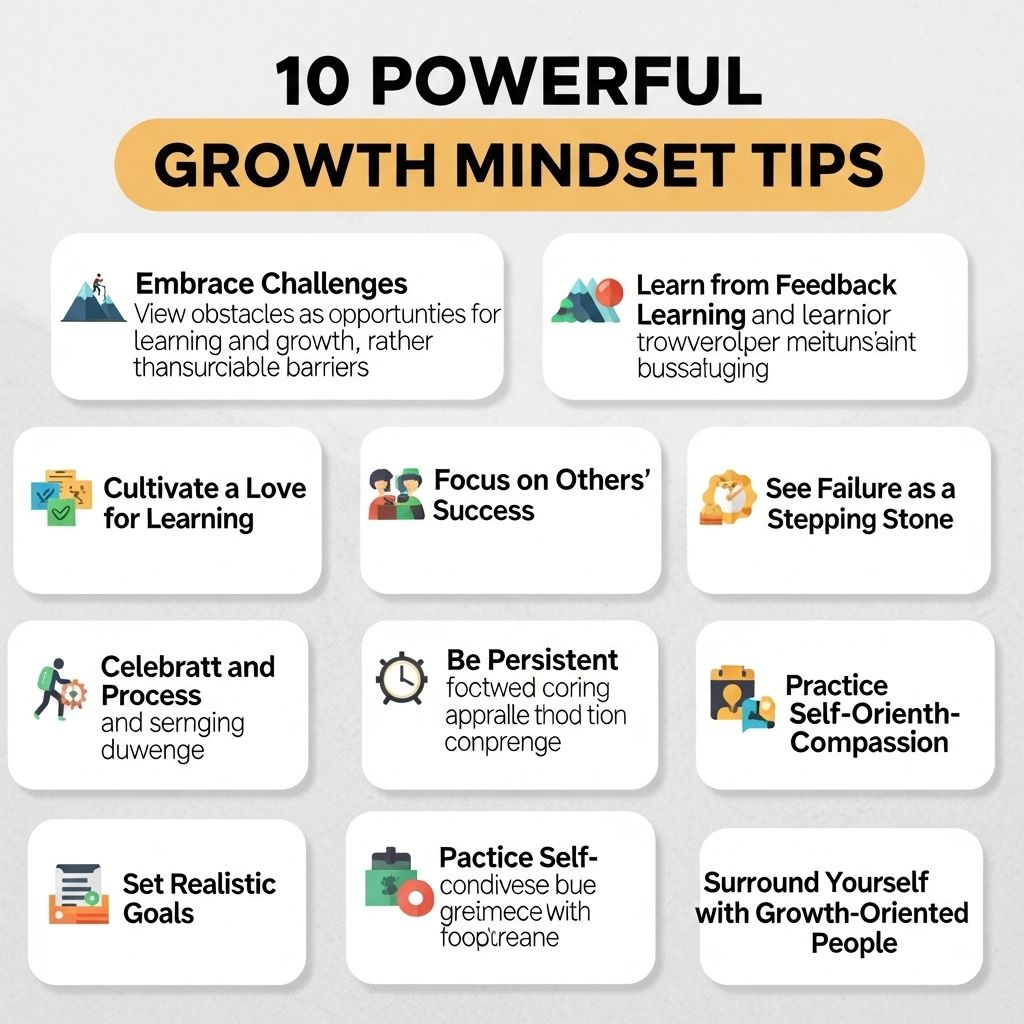In today’s fast-paced world, cultivating a growth mindset can be a game changer. This approach to learning emphasizes the ability to grow, adapt, and thrive in the face of challenges. Whether you’re a student, a professional, or someone simply looking to improve their personal life, embracing a growth mindset can unlock your full potential. Let’s explore some powerful tips that can help you foster this mindset and ultimately drive your success.
Table of Contents
Understanding the Growth Mindset
A growth mindset, as defined by psychologist Carol Dweck, is the belief that abilities and intelligence can be developed through dedication and hard work. It contrasts with a fixed mindset, where individuals believe that their talents are innate and unchangeable. The growth mindset encourages resilience, curiosity, and a willingness to learn from failures.
Key Characteristics of a Growth Mindset:
- Embracing challenges: Viewing challenges as opportunities for growth.
- Persistence in the face of setbacks: Maintaining effort despite difficulties.
- Effort leads to mastery: Believing that effort is a path to success.
- Learning from criticism: Accepting feedback as a tool for improvement.
- Inspired by others’ success: Finding motivation in the achievements of others.
1. Embrace Challenges
The first step in adopting a growth mindset is to actively seek out challenges. View them as opportunities to learn rather than obstacles. When you encounter a difficult situation, ask yourself:
- What can I learn from this?
- How can I improve my skills through this experience?
- What strategies can I employ to overcome this challenge?
2. Cultivate Resilience
Resilience is the ability to bounce back from failure. When you develop resilience, you can handle setbacks without losing motivation. Here are some strategies to cultivate resilience:
- Practice self-compassion: Treat yourself kindly when faced with failure.
- Set realistic goals: Break larger tasks into manageable steps.
- Maintain a positive outlook: Focus on the silver lining in difficult situations.
3. Value Effort Over Results
In a growth mindset, the emphasis is placed on the effort you put into your work rather than the outcome. Shifting your focus in this way can help you develop a love for learning and self-improvement. Consider the following:
- Set process-oriented goals instead of outcome-oriented goals.
- Celebrate your effort and persistence, regardless of the final result.
- Reflect regularly on your learning journey.
4. Embrace Feedback
Feedback is a vital component for growth. When you receive constructive criticism, it can provide valuable insights into your performance. To embrace feedback effectively:
- Ask for feedback regularly.
- Listen actively without becoming defensive.
- Implement the feedback into your improvement plan.
5. Learn from Failure
Failure should not be seen as the end; rather, it is a stepping stone towards success. To effectively learn from failure:
- Analyze what went wrong and why.
- Identify the lessons learned.
- Develop a plan to avoid similar mistakes in the future.
6. Surround Yourself with Growth-Minded Individuals
The people you interact with can greatly influence your mindset. Seek out individuals who exemplify a growth mindset; their attitudes can inspire and motivate you. Consider:
- Joining groups or communities that promote personal growth.
- Engaging with mentors who have overcome challenges.
- Learning from peers who share similar growth objectives.
7. Practice a Learning Orientation
Adopting a learning orientation means prioritizing personal development over perfection. This can be achieved by:
- Engaging in lifelong learning through courses, workshops, and reading.
- Taking on new responsibilities that challenge your current skill set.
- Asking questions and seeking knowledge in your field.
8. Set SMART Goals
Setting SMART (Specific, Measurable, Achievable, Relevant, Time-bound) goals is essential for maintaining focus and motivation. For example:
| Goal Element | Example |
|---|---|
| Specific | Improve public speaking skills |
| Measurable | Give three presentations within the next six months |
| Achievable | Enroll in a public speaking course |
| Relevant | Useful for career advancement |
| Time-bound | Deadline of six months |
9. Find Inspiration in Others
Look to successful figures who embody the growth mindset. Their journeys can provide valuable lessons and insights. Examples include:
- J.K. Rowling, who faced numerous rejections before publishing Harry Potter.
- Thomas Edison, whose many failed experiments led to the invention of the light bulb.
- Oprah Winfrey, who overcame adversity to become a media mogul.
10. Reflect on Your Progress
Regular reflection encourages self-awareness and helps you recognize how far you’ve come. To effectively reflect:
- Keep a journal to document your experiences, challenges, and successes.
- Review your goals and progress regularly.
- Acknowledge improvements and milestones, no matter how small.
In conclusion, adopting a growth mindset is a continuous journey that requires effort and persistence. By implementing these strategies, you’ll not only enhance your abilities but also foster a greater sense of fulfillment in your personal and professional life. Start today by embracing challenges, valuing effort, and learning from every experience.
FAQ
What is a growth mindset?
A growth mindset is the belief that abilities and intelligence can be developed through dedication, hard work, and learning.
How can I develop a growth mindset?
You can develop a growth mindset by embracing challenges, learning from criticism, and viewing failures as opportunities for growth.
What are some tips for fostering a growth mindset?
Some tips include setting realistic goals, celebrating small achievements, surrounding yourself with positive influences, and practicing self-reflection.
Why is a growth mindset important for success?
A growth mindset encourages resilience, adaptability, and a love for learning, all of which are crucial for achieving long-term success.
How can I encourage a growth mindset in my children?
You can encourage a growth mindset in children by praising their efforts instead of their intelligence, promoting perseverance, and helping them set personal goals.
Can a growth mindset improve my career prospects?
Yes, a growth mindset can improve career prospects by enhancing problem-solving skills, fostering innovation, and increasing your willingness to take on challenges.









